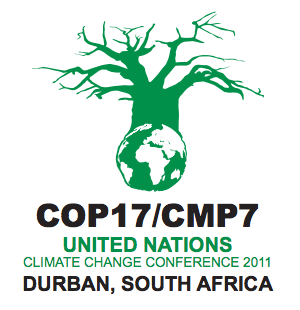
Image credit: © COP17
Side event : Long-term prospective of business contribution to low carbon development
December 6th 2011
Joint Side Event organized by ICC and MPDD Chair
Energy modeling can move energy policy debate beyond misconceptions and illustrate common ground for moving forward. This is one of the aims of the ParisTech Chair Modeling for sustainable development – MINES ParisTech. MINES ParisTech energy and technology scenarios will be discussed by industrial experts and government representatives from developing and developed countries in order to assess the consequences of low carbon policies on energy through its externality issues: Water, Raw materials, Renewable and CCS technologies spread, Smart grid, Energy efficiency.
Programme
Side event : Long-term prospective of business contribution to low carbon development
December 5th 2011
Any post-2012 mechanism is expected to deliver much more GHG reduction than the Kyoto protocol by 2020 and even more by 2050. The technical challenges for the world energy systems over the next 50 years are huge. As highlighted in the 2010 edition of IEA’s energy technology perspective, end-use efficiency should represent as much as 38%, while several production technologies will need to be installed at extremely higher rate than those delivered by the plant construction industry. In this transition to greener energy systems Africa has an expected role to play inducing both financial and energy technology implementation levels. Through a panel of academic and industrial presentations, this side event highlighted some enabling factors for an increased access to low carbon energy sources in Africa: accurate diagnosis, long term policy definition, example of business implication, technology choice.
Programme
COP28 : Dubai (UAE) 2023
Image credit: © UAE Government Side event: Global energy transition and local realities: vulnerabilities, development, mitigation, [...]
COP27 : Charm el-Cheikh (Égypte) 2022
Image credit: © Government of Egypt Side event: Green hydrogen: how to reconcile North/South stakes in [...]
COP26 : Glasgow (Royaume-Uni) 2021
Image credit: © UK Government Side Event 100% renewable energy system: a credible target? 10 novembre [...]
COP25 CHILE : Madrid (Espagne) 2019
Image credit: © Ministry of the Presidency - Government of Spain Side event: Considering social acceptance [...]



